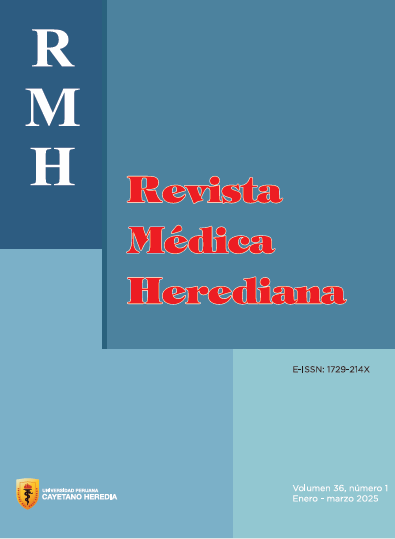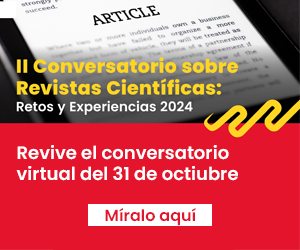Patterns of Alcohol Consumption and Adherence to Anti-Retroviral Therapy(ART) in patients with HIV
DOI:
https://doi.org/10.20453/rmh.v36i1.5699Keywords:
Alcohol drinking, antiretroviral therapy highly active, HIV Seroprevalence, HIV Treatment Adherence and ComplianceAbstract
Objective: To identify alcohol consumption patterns associated with adherence to anti-retroviral therapy (ART) among HIV-infected patients. Methods: A cross-sectional study was conduced among 4000 patients above 18 years of age who received ART through the Estrategia Sanitaria Nacional de Prevención y Control de ITS- VIH/SIDA from 2004 in one hospital in Lima. We randomly selected 351 patients and performed the analysis from September 2017 to January 2018. Alcohol consumption was evaluated by measuring intake at least once per life, in the last year, in the previous six months, last month, and in the last seven days. Adherence was measured using the Simplified Medication Adherence Questionnaire (SMAQ). Prevalence ratios were calculated. The Comité de Ética del Hospital Nacional Cayetano Heredia y de la Universidad Peruana Cayetano Heredia approved the study. Results: 74% were males; the mean age was 38 and 25% adhered to ART. An association between adherence and consumption in the last six months (p=0.017) and in the last month (p=0.011) with a prevalence rate of 1.158 (1.022<RP<1.312) and 1.167 (1.037<RP<1.312), respectively. Conclusion: Alcohol consumption in the last six and previous months is associated with lack of adherence to ART.
Downloads
References
Carvalho PP, Barroso SM, Coelho HC, Penaforte FR de O. Factors associated with antiretroviral therapy adherence in adults: an integrative review of literature. Cien Saude Colet. 22 de julio de 2019; 24:2543-55. doi: 10.1590/1413-81232018247.22312017.
Silva JAG, Dourado I, Brito AM de, Silva CAL da. Factors associated with non-adherence to antiretroviral therapy in adults with AIDS in the first six months of treatment in Salvador, Bahia State, Brazil. Cad Saude Publica. Junio de 2015; 31:1188-98. doi: 10.1590/0102-311X00106914.
Azar MM, Springer SA, Meyer JP, Altice FL. A systematic review of the impact of alcohol use disorders on HIV treatment outcomes, adherence to antiretroviral therapy and health care utilization. Drug Alcohol Depend. 1 de diciembre de 2010;112(3):178-93. doi: 10.1016/j.drugalcdep.2010.06.014.
Chander G, Lau B, Moore RD. Hazardous Alcohol Use: A Risk Factor for Non-Adherence and Lack of Suppression in HIV Infection. J Acquir Immune Defic Syndr. 1 de diciembre de 2006;43(4):411-7. doi: 10.1097/01.qai.0000243121.44659.a4.
Shuper PA, Neuman M, Kanteres F, Baliunas D, Joharchi N, Rehm J. Causal Considerations on Alcohol and HIV/AIDS — A Systematic Review. Alcohol Alcohol. 1 de marzo de 2010;45(2):159-66. doi: 10.1093/alcalc/agp091.
Braithwaite RS, Bryant KJ. Influence of Alcohol Consumption on Adherence to and Toxicity of Antiretroviral Therapy and Survival. Alcohol Res Health. 2010;33(3):280-7.
Neuman MG, Schneider M, Nanau RM, Parry C. Alcohol Consumption, Progression of Disease and Other Comorbidities, and Responses to Antiretroviral Medication in People Living with HIV. AIDS Res Treat. 2012;2012 :751827. doi: 10.1155/2012/751827.
Szabo G, Saha B. Alcohol’s Effect on Host Defense. Alcohol Res. 2015;37(2):159-70.
Wu ES, Metzger DS, Lynch KG, Douglas SD. Association between Alcohol Use and HIV Viral Load. J Acquir Immune Defic Syndr. 15 de abril de 2011;56(5):e129-30. doi: 10.1097/QAI.0b013e31820dc1c8.
Capasso A, Brown JL, Safonova P, Belyakov N, Rassokhin V, DiClemente RJ. Heavy Alcohol Use is Associated with Lower CD4 Counts among Russian Women Living with HIV: A Multilevel Analysis. AIDS Behav. 1 de noviembre de 2021;25(11):3734-42. doi: 10.1007/s10461-021-03270-4.
Kowalski S, Colantuoni E, Lau B, Keruly J, McCaul ME, Hutton HE, et al. Alcohol Consumption and CD4 T-cell count response among persons initiating antiretroviral therapy. J Acquir Immune Defic Syndr. 1 de diciembre de 2012;61(4):455-61. doi: 10.1097/QAI.0b013e3182712d39.
Transparencia HCH. Misión y Visión del Hospital Nacional Cayetano Heredia [Internet]. [citado 28 de mayo de 2022]. Disponible en: https://www.gob.pe/institucion/hnch/institucional
Babor, Thomas F., et al. Cuestionario de Identificación de los Transtornos debidos al Consumo de Alcohol. Ginebra: Organización Mundial de la Salud (2001): 1-40.
Ministerio de Salud. NTS N° 097-MINSA/DGSP-V.03. Norma Técnica de Salud de Atención Integral del Adulto con Infección por el Virus de la Inmunodeficiencia Humana (VIH)-Resolución Ministerial-No 215-2018/MINSA [Internet]. [citado 15 de octubre de 2018]. Disponible en: https://cdn.www.gob.pe/uploads/document/file/187987/187482_R.M_215-2018-MINSA.PDF20180823-24725-6ni25d.PDF?v=1535061635
Knobel H, Alonso J, Casado JL, Collazos J, González J, Ruiz I, et al. Validation of a simplified medication adherence questionnaire in a large cohort of HIV-infected patients: the GEEMA Study. AIDS. marzo de 2002;16(4):605. doi: 10.1097/00002030-200203080-00012.
Ortega Suárez FJ, Sánchez Plumed J, Pérez Valentín MA, Pereira Palomo P, Muñoz Cepeda MA, Lorenzo Aguiar D. Validación del cuestionario simplificado de adherencia a la medicación (SMAQ) en pacientes con trasplante renal en terapia con tacrolimus. Nefrología (Madrid). 2011 [Citado 15 de octubre de 2018];31(6):690-6. Disponible en: http://scielo.isciii.es/scielo.php?script=sci_artext&pid=S0211-69952011000600011&lng=es.
WHO [Internet]. WHO | Adherence to Long-Term Therapies: Evidence for Accion. [citado 15 de octubre de 2018]. Disponible en: https://iris.who.int/bitstream/handle/10665/42682/9241545992.pdf?sequence=1&isAllowed=y
Chesney MA. The Elusive Gold Standard: Future Perspectives for HIV Adherence Assessment and Intervention. J Acquir Immune Defic Syndr. diciembre de 2006;43:S149 -55. doi: 10.1097/01.qai.0000243112.91293.26..
Denison JA, Packer C, Stalter RM, Banda H, Mercer S, Nyambe N, et al. Factors Related to Incomplete Adherence to Antiretroviral Therapy among Adolescents Attending Three HIV Clinics in the Copperbelt, Zambia. AIDS Behav. marzo de 2018;22(3):996-1005. doi: 10.1007/s10461-017-1944-x.
Kelso-Chichetto NE, Plankey M, Abraham AG, Ennis N, Chen X, Bolan R, et al. Association between alcohol consumption trajectories and clinical profiles among women and men living with HIV. Am J Drug Alcohol Abuse. 2 de enero de 2018;44(1):85-94. doi: 10.1080/00952990.2017.1335317.
Malbergier A, Amaral RA do, Cardoso LD. Alcohol dependence and CD4 cell count: is there a relationship? AIDS Care. 2 de enero de 2015;27(1):54-8. doi: 10.1080/09540121.2014.947235.
Hahn JA, Cheng DM, Emenyonu NI, Lloyd-Travaglini C, Fatch R, Shade SB, et al. Alcohol Use and HIV Disease Progression in an Antiretroviral Naïve Cohort. J Acquir Immune Defic Syndr. 15 de abril de 2018;77(5):492-501. doi: 10.1097/QAI.0000000000001624.
Long JE, Richardson BA, Wanje G, Wilson KS, Shafi J, Mandaliya K, et al. Alcohol use and viral suppression in HIV-positive Kenyan female sex workers on antiretroviral therapy. PLoS One. 24 de noviembre de 2020;15(11):e0242817. doi: 10.1371/journal.pone.0242817.
Sarna A, Singh R, Schensul J, Gaikwad S, Joshi K, Malye R, et al. Viral load outcomes in a cohort of alcohol-consuming people living with HIV receiving antiretroviral therapy in Mumbai, India. Int J STD AID. 11 de junio de 2020;31. doi: 10.1177/0956462420921731.
Braithwaite RS, McGinnis KA, Conigliaro J, Maisto SA, Crystal S, Day N, et al. A Temporal and Dose‐Response Association Between Alcohol Consumption and Medication Adherence Among Veterans in Care. Alcoholism: Alcohol Clin Exp Res. 1 de julio de 2005;29(7):1190-7. doi: 10.1097/01.alc.0000171937.87731.28.
Musayón-Oblitas Y, Cárcamo C, Gimbel S, Echevarría J, Graña A. Validez de la evaluación del consumo de alcohol establecido en la norma técnica de atención integral del adulto con infección por el VIH. Rev Méd Hered. 24 de enero de 2023;33(4):265-71. http://dx.doi.org/10.20453/rmh.v33i4.4405.
Downloads
Published
How to Cite
Issue
Section
License
Copyright (c) 2025 Yesenia Musayón-Oblitas, César Cárcamo, Sarah Gimbel, Juan Echevarría, Ana Graña

This work is licensed under a Creative Commons Attribution 4.0 International License.
Authors assign their rights to the RMH so that may disseminate the article through the means at their disposal. The journal will provide forms of affidavit of authorship and authorization for the publication of the article, which shall be submitted with the manuscript. Authors retain the right to share, copy, distribute, perform and publicly communicate their article, or part of it, mentioning the original publication in the journal.




















